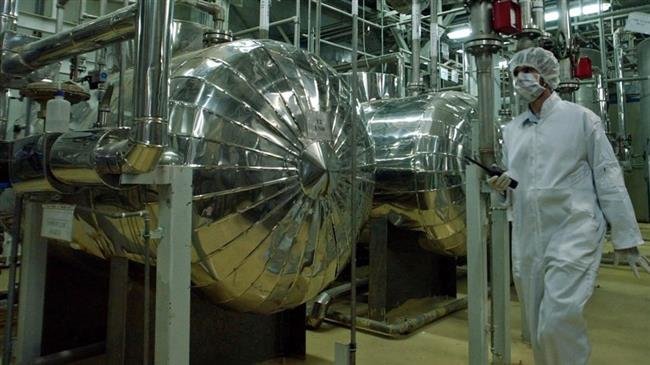Head of the Atomic Energy Organization of Iran (AEOI) Ali Akbar Salehi says the country has broken new ground in the field of nuclear technology and is now taking preliminary steps toward production of 20-percent modern nuclear fuel.
Speaking in an exclusive interview with the IRIB News Agency on Sunday, Salehi said the new nuclear fuel produced by domestic specialists will be able to keep all kinds of reactors similar to the Tehran Research Reactor running.
“Preliminary steps have been taken to design modern 20-percent fuel and we are on the threshold [of producing it]. This [new] product is different from the previous 20-percent fuel and we can supply fuel to any reactor similar to the Tehran [Research] Reactor,” Salehi said, according to Press TV.
Iran’s nuclear chief added that the Tehran Research Reactor has been operating on older types of nuclear fuel so far, but the new modern fuel will boost its productivity.
He said Iranian scientists have made such remarkable advances in the field of nuclear technology that instead of reverse engineering, they are now capable of designing new fuel, which is a major achievement for the country.
Salehi further stated that supplying fuel and designing the control room were major steps in building a reactor, adding, “At the present time, designing a reactor has become very possible for our specialists.”
Iran can enrich uranium to 20 percent ‘immediately’
Elsewhere in his remarks, Iran’s atomic energy chief said that the country can enrich uranium up to 20 percent within “three to four days.”
Under the nuclear agreement, which is officially known as the Joint Comprehensive Plan of Action (JCPOA), Iran has agreed to keep its stock of low-enriched uranium below 300 kilograms. The deal stipulates that Iran must “keep its level of uranium enrichment at up to 3.67 percent for 15 years.”
“But if we leave the JCPOA, we can exceed the (300-kg) cap and use the stockpile as fuel needed for the Arak reactor,” Salehi stated.
“Our stockpiled enriched uranium is large enough to satisfy the needs of the country,” he said, adding, “We can immediately increase our enriched uranium stockpile and purity.”
AEOI’s spokesman, Behrouz Kamalvandi, told reporters last June that Iran would soon start re-building the Arak heavy water reactor once a Chinese expert team finished examining the last phase of the re-designing process.
“According to the timetable, we have fortunately made good progress, and the detailed stage has been completed on our part and delivered to the Chinese side, which … will enter the next stage within 2 to 3 months; that is, we’ll start the next phase of building and [installing the reactor’s] equipment,” he added.
Kamalvandi said the US withdrawal from the Iran nuclear deal would not affect the re-designing process of the Iranian reactor.
US President Donald Trump withdrew his country in May 2018 from the landmark Iran nuclear deal, and decided to re-impose unilateral sanctions against Tehran.
Last November, the Trump administration announced the re-imposition of the “toughest” sanctions ever against Iran’s banking and energy sectors with the aim of cutting off the country’s oil sales and crucial exports.
A first round of American sanctions took effect in August, targeting Iran’s access to the US dollar, metals trading, coal, industrial software, and auto sector.
The US administration hoped to get the other parties to the deal with Iran to likewise scrap the deal, but instead, they stressed that not only would they stick to the agreement, but they would also work to sustain it in the face of increased US pressure. Europeans believe that the nuclear deal is an important element of international security.
H.M

